Prejudice towards Nigeria or Nigerian people
Anti-Nigerian sentiment [1] is the dislike of Nigeria or Nigerians.
| Part of a series on |
| Discrimination |
|---|
 |
Anti-Nigerian sentiment [1] is the dislike of Nigeria or Nigerians.
Anti-Nigerian sentiment arose among Igbo people during the Nigerian Civil War of 1967–1970, when the predominately Igbo region seceded from Nigeria and attempted to establish an independent Republic of Biafra. [2] In the 1969 Ahiara Declaration, Biafran president Chukwuemeka Odumegwu Ojukwu stated, "The Federation of Nigeria is today as corrupt, as unprogressive and as oppressive and irreformable as the Ottoman Empire was in Eastern Europe over a century ago. And in contrast, the Nigerian Federation in the form it was constituted by the British cannot by any stretch of imagination be considered an African necessity. Yet we are being forced to sacrifice our very existence as a people to the integrity of that ramshackle creation that has no justification either in history or in the freely expressed wishes of the people." [3] Although Biafra was defeated and reintegrated into Nigeria, various Biafran nationalist groups such as Indigenous People of Biafra and Movement for the Actualization of the Sovereign State of Biafra continue the goal of seceding from Nigeria.
Kenyan police arrested two Nigerian nationals following the discovered death of a Kenyan woman on 14 January 2024. [4] The arrests led to a public campaign among Kenyan citizens to deport Nigerians from the country. [5]
Since the end of apartheid in 1994, Nigerians and other foreign nationals began migrating to South Africa in large numbers. This has led to xenophobic sentiments among Black South Africans due to scarce economic opportunities. Nigerians are among the common targets of xenophobia in South Africa. [6] The portrayal of Nigerians as illegal drug dealers has often been used to justify xenophobic violence towards Nigerians in South Africa. [7] On 18 October 2007, South African musician Lucky Dube was shot dead because his assailants allegedly mistook him for a Nigerian. [8]
The 2009 South African science fiction film District 9 faced controversy for its alleged negative portrayal of Nigerians. Nigeria's Information Minister Dora Akunyili asked movie cinemas around Nigeria to either ban the film or edit out specific references to the country because of the film's negative depiction of the Nigerian characters as criminals and cannibals. Letters of complaint were sent to the producer and distributor of the film demanding an apology. She also said the gang leader Obesandjo is almost identical in spelling and pronunciation to the surname of former Nigerian president Olusegun Obasanjo. [9] The film was later banned in Nigeria; the Nigerian Film and Video Censors Board was asked to prevent cinemas from showing the film and also to confiscate it. [10] Hakeem Kae-Kazim, a Nigerian-born British actor, also criticised the portrayal of Nigerians in the film.
During the 2019 Johannesburg riots, shops owned by Nigerians and other foreign nationals were attacked and looted [11] following the death of a taxi driver. [12] By 3 September, police had made 189 arrests for looting. [13] Around 50 businesses predominantly owned by Nigerians were reportedly destroyed or damaged during the incident. [14] The riots coincided with a nationwide truck driver strike protesting against the employment of non-South African truckers. [15] After riots resulted in 12 deaths in the first week of September, 640 of an estimated 100,000 Nigerians in South Africa signed up to take free flights offered by Nigeria to return to their home country. [16] [17]
During the Nigerian Civil War, Biafran officials collaborated with American politicians and public relations firms to spread anti-Nigerian sentiments among Americans. [18] The American Committee to Keep Biafra Alive widely propagated negative images of Nigeria and made disputed assertions that Nigeria was committing a mass genocide in Biafra. [19]
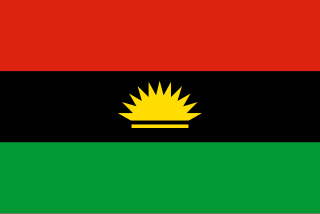
Biafra, officially the Republic of Biafra, was a partially recognised state in West Africa that declared independence from Nigeria and existed from 1967 until 1970. Its territory consisted of the former Eastern Region of Nigeria, predominantly inhabited by the Igbo ethnic group. Biafra was established on 30 May 1967 by Igbo military officer and Eastern Region governor C. Odumegwu Ojukwu under his presidency, following a series of ethnic tensions and military coups after Nigerian independence in 1960 that culminated in the 1966 anti-Igbo pogrom. The Nigerian military proceeded in an attempt to reclaim the territory of Biafra, resulting in the start of the Nigerian Civil War. Biafra was formally recognised by Gabon, Haiti, Ivory Coast, Tanzania, and Zambia while receiving de facto recognition and covert military support from France, Portugal, Israel, South Africa and Rhodesia. After nearly three years of war, during which around two million Biafran civilians died, President Ojukwu fled into exile in Ivory Coast as the Nigerian military approached the capital of Biafra. Philip Effiong became the second president of Biafra, and he oversaw the surrender of Biafran forces to Nigeria.
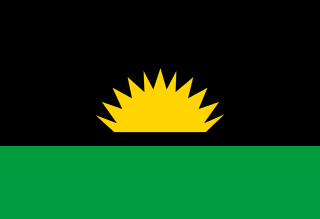
The Republic of Benin was a short-lived unrecognized secessionist state in West Africa that existed for seven hours in 1967. It was established on 19 September 1967 during the Nigerian Civil War as a puppet state of Biafra, following its occupation of Nigeria's Mid-Western Region, and named after its capital, Benin City, with Albert Nwazu Okonkwo as its head of government.

Chukwuemeka "Emeka" Odumegwu Ojukwu was a Nigerian military officer and politician who served as President of the Republic of Biafra from 1967 to 1970 during the Nigerian Civil War. He previously served as military governor of the Eastern Region of Nigeria, which he declared as the independent nation of Biafra.

The Nigerian Civil War, also known as the Biafran War, was a civil war fought between Nigeria and the Republic of Biafra, a secessionist state which had declared its independence from Nigeria in 1967. Nigeria was led by General Yakubu Gowon, and Biafra by Lieutenant Colonel Chukwuemeka "Emeka" Odumegwu Ojukwu. Biafra represented the nationalist aspirations of the Igbo ethnic group, whose leadership felt they could no longer coexist with the federal government dominated by the interests of the Muslim Hausa-Fulanis of Northern Nigeria. The conflict resulted from political, economic, ethnic, cultural and religious tensions which preceded the United Kingdom's formal decolonisation of Nigeria from 1960 to 1963. Immediate causes of the war in 1966 included a military coup, a counter-coup, and anti-Igbo pogroms in Northern Nigeria.

The Movement for the Actualization of the Sovereign State of Biafra (MASSOB) is a secessionist movement in Nigeria, associated with Igbo nationalism, which supports the recreation of an independent state of Biafra. It was founded in 1999 and is led by an Indian-trained lawyer Ralph Uwazuruike, with headquarters in Okwe, in the Okigwe district of Imo State.

The flag of Biafra, used by the Republic of Biafra during the Nigerian Civil War (1967–1970), consists of a horizontal tricolour of red, black, and green, charged with a golden rising sun over a golden bar. The eleven rays of the sun represent the eleven former provinces of Biafra. The rays are typically long and slender with the lowest rays being nearly horizontal and the remaining rays spread evenly between.
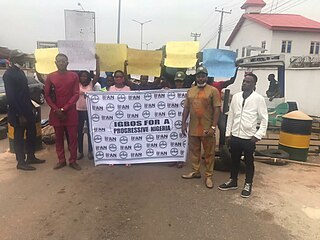
Anti-Igbo sentiment encompasses a range of negative attitudes and feelings towards the Igbo people. The Igbo people make up all of south-eastern Nigeria and a part of South-South and Middle Belt Nigeria's geopolitical zones. Igbophobia is observable in critical and hostile behaviour such as political and religious discrimination and violence towards the Igbo.
Prior to 1994, immigrants from elsewhere faced discrimination and even violence in South Africa due to competition for scarce economic opportunities. After majority rule in 1994, contrary to expectations, the incidence of xenophobia increased. In 2008, at least 62 people were killed in the xenophobic uprising and attacks. In 2015, another nationwide spike in xenophobic attacks against immigrants in general prompted a number of foreign governments to begin repatriating their citizens. A Pew Research poll conducted in 2018 showed that 62% of South Africans expressed negative sentiment about foreign nationals living and working in South Africa, believing that immigrants are a burden on society by taking jobs and social benefits and that 61% of South Africans thought that immigrants were more responsible for crime than other groups. There is no factual evidence to substantiate the notion that immigrants are the main culprits of criminal activity in South Africa, even though the claim is incorrectly made in sometimes by politicians and public figures. Between 2010 and 2017 the number of foreigners living in South Africa increased from 2 million people to 4 million people. The proportion of South Africa's total population that is foreign born increased from 2.8% in 2005 to 7% in 2019, according to the United Nations International Organization for Migration, South Africa is the largest recipient of immigrants on the African continent.

The fall of Enugu was a military conflict between Nigerian and Biafran forces in September and October 1967 during the Nigerian Civil War which centered around Enugu, the capital of the secessionist Republic of Biafra. Nigerian federal forces had made Enugu's capture a priority shortly after war broke out, but their advance stalled at Nsukka. Biafran president and leader Odumegwu Ojukwu, attempted to distract the Nigerian Army by initiating an invasion of Nigeria's Mid-Western Region in August, but the offensive was brought to a halt. Lieutenant Colonel Theophilus Danjuma took charge of the Nigerian forces at the Nsukka front and prepared to advance on Enugu with seven battalions of the 1st Division. Enugu was garrisoned by one brigade led by Colonel Alexander Madiebo and poorly armed civilians called into service. Danjuma decided to launch an offensive with his forces spread over a broad front to make it more difficult for the Biafrans to block them along major roads as had happened up to that point.
The Operation UNICORD was an offensive launched by the Nigerian Army at the beginning of the Nigerian Civil War. It involved the capture of 6 major Biafran towns near their northern border.
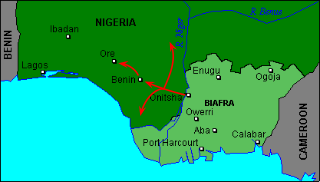
The Midwest Invasion of 1967 codenamed Operation Torch, was a military operation between Nigerian and Biafran military forces during the Nigerian Civil War. The invasion began on August 9 when 3,000 Biafran soldiers led by General Victor Banjo crossed the River Niger Bridge into Asaba. Upon reaching Agbor, the Biafrans split up. With the 12th Battalion moving west capturing Benin City and Ore, the 18th Battalion swung south, taking Warri, Sapele and Ughelli, while the 13th Battalion headed north for Auchi, Agenebode and Okene. Simultaneously, a plot to capture Mid-Western Governor David Ejoor at his home in Benin failed. Nevertheless, the Biafrans, meeting virtually no resistance, had seized the entire Mid-Western Region in less than 12 hours.
On 11 April 2015, several South Africans attacked foreigners in a xenophobic attack in Durban, South Africa, which extended to some parts of Johannesburg. Several people, both foreign and South African alike, were killed with some of the killings captured on camera.

Nnamdi Okwu Kanu is a British-Nigerian political activist who advocates for the secession and independence of Biafra from Nigeria. He is the leader of the Indigenous People of Biafra (IPOB), which he founded in 2014. The main aim of IPOB is to restore the defunct separatist state of Biafra which existed in Nigeria's Eastern Region during the Nigerian Civil War of 1967–1970.

The Indigenous People of Biafra (IPOB) is a separatist group in Nigeria that aims to restore the defunct Republic of Biafra, a country which seceded from Nigeria prior to the Nigerian Civil War (1967–1970). Since 2021, IPOB and other Biafran separatist groups have been fighting a low-level guerilla conflict in southeastern Nigeria against the Nigerian government. The group was founded in 2012 by Nnamdi Kanu and Uche Mefor. Kanu is known as a British Nigerian political activist known for his advocacy of the contemporary Biafran independence movement. It was deemed a terrorist organization by the Nigerian government in 2017 under the Nigerian Terrorism Act. As of May 2022, the United Kingdom started denying asylum to members of IPOB who engaged in human rights abuses, though the U.K. government clarified that IPOB had not been designated as a terrorist organisation.
The 2015–2016 Killing of Biafran Protesters refers to the killing of demonstrators demanding the restoration of the sovereignty of the Republic of Biafra by Nigerian security forces, especially the Nigerian army, across the southeastern parts of Nigeria. The demonstrations were spearheaded by several separatist movements. In addition, residents of the above-mentioned region have often been subjected to conditions synonymous with those obtainable in a Police State.
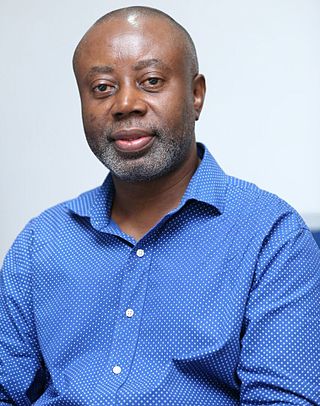
Chido Onumah is a Nigerian journalist, writer, and rights activist. He has worked for over two decades as a journalist, rights activist and media trainer in Nigeria, Ghana, Canada, India, the US, the Caribbean and Europe. He holds a PhD in Communication and Journalism from the Autonomous University of Barcelona, UAB, Spain. Onumah is a columnist with several newspapers.

Igbo nationalism is a range of ethnic nationalist ideologies relating to the Igbo people of southeastern Nigeria. While the term is defined as seeking Igbo self-determination by some, others argue that it refers to the preservation and revival of Igbo culture and, for others, the development of Igboland stemming from the philosophy, Aku luo uno, which means "wealth builds the home".
The 2019 Johannesburg riots occurred in the South African city of Johannesburg from 1–5 September 2019, leading to the deaths of at least seven people. The riots were xenophobic in nature, targeting foreign nationals from other African countries. Retaliatory actions by rioters in other African nations was taken against South African brands. The South African Institute of Race Relations stated that the riots were similar in nature and origin to the 2008 xenophobic riots that also occurred in Johannesburg.

The insurgency in Southeastern Nigeria is a military conflict that broke out in the city of Orlu, Imo State, Nigeria on 16 January 2021, when the Nigerian Army moved to crush the paramilitary wing of the Indigenous People of Biafra (IPOB), the Eastern Security Network (ESN). The conflict escalated after the ESN managed to repulse the initial push by the Nigerian Army, but IPOB ended the initial crisis by unilaterally withdrawing the ESN from Orlu. After a few weeks of quiet, Nigeria launched a military offensive in the area to destroy the ESN. On 19 February 2021, IPOB declared that as of the day before, a state of war existed between Nigeria and Biafra. Three weeks later, another separatist group declared the formation of a Biafran interim government which was subsequently endorsed by IPOB. Since then, the Biafran separatists have begun to form alliances with other separatist groups in Nigeria and Cameroon. Despite these developments, the separatists claimed that their militant operations were mainly aimed at defending local communities from armed herders and bandits instead of fighting the Nigerian government. In late June, IPOB leader Nnamdi Kanu was arrested by Interpol and handed over to Nigerian authorities.

The Eastern Security Network (ESN) is the paramilitary organization of the Indigenous People of Biafra (IPOB), a pro-Biafra separatist movement.